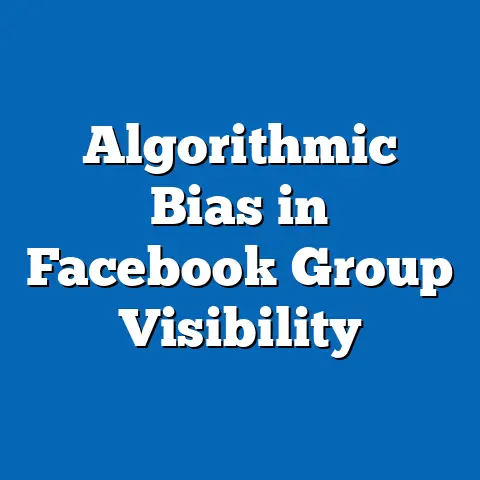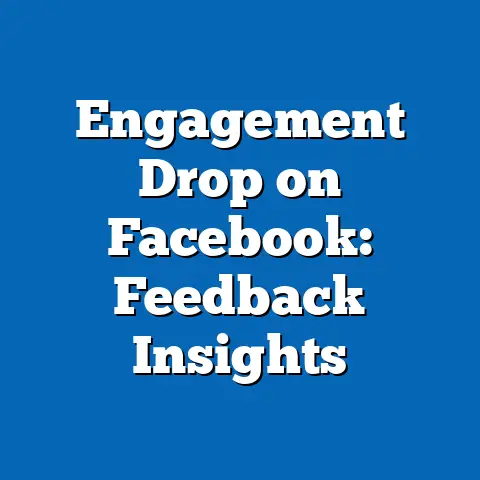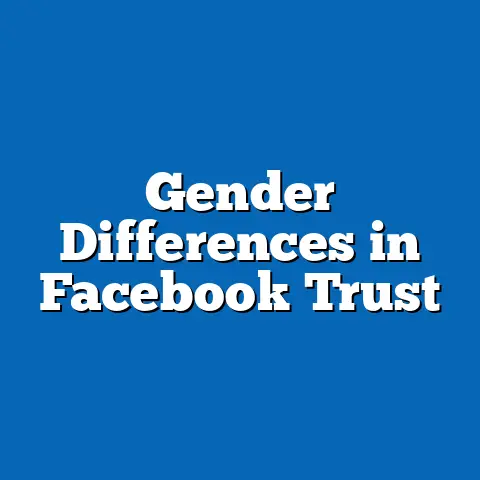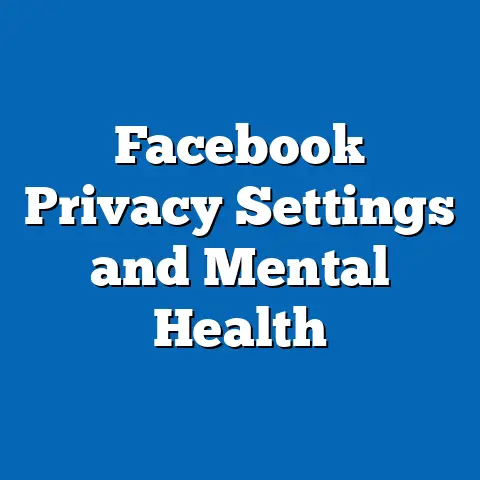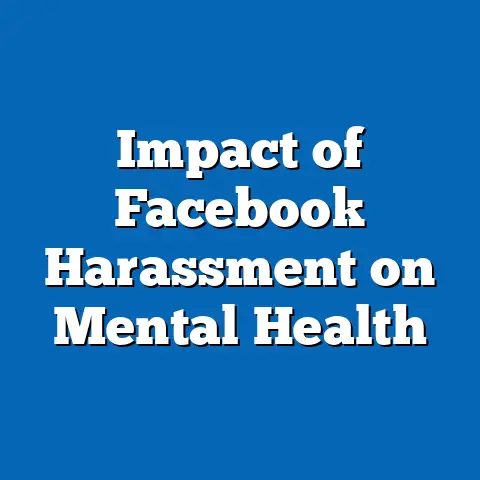Attitudes on Facebook Censorship: Poll Data
I remember a time, not so long ago, when social media felt like an untamed frontier—a space where opinions flowed freely, often unfiltered, for better or worse.
As a teenager in the early 2010s, I watched friends and family post everything from political rants to memes without a second thought about “content moderation.” Fast forward to today, and the landscape of platforms like Facebook (now Meta) has shifted dramatically, with censorship and content moderation becoming hot-button issues that spark fierce debate across demographics.
Recent poll data reveals a deeply divided public on the issue of Facebook censorship.
According to a 2023 Pew Research Center survey, 59% of U.S.
adults believe that Facebook censors content unfairly, while 41% feel the platform’s moderation practices are necessary to maintain a safe online environment.
These attitudes vary starkly by age, political affiliation, and education level, with younger users and conservatives expressing greater skepticism toward censorship practices.
This article delves into the nuances of public opinion on Facebook censorship, drawing on comprehensive poll data from sources like Pew Research Center, Gallup, and YouGov.
We’ll explore key demographic breakdowns, compare current attitudes with historical trends, and consider the broader cultural and technological factors shaping these views.
Finally, we’ll look ahead to what these trends might mean for the future of content moderation and free expression online.
Detailed Analysis of Public Attitudes on Facebook Censorship
Overall Sentiment: A Divided Public
Public opinion on Facebook’s content moderation policies is far from unified.
The 2023 Pew Research Center survey found that 59% of U.S.
adults believe the platform engages in unfair censorship, often citing concerns about bias against certain political viewpoints or overly strict rules on permissible speech.
Conversely, 41% support moderation efforts, emphasizing the need to curb misinformation, hate speech, and harmful content.
This divide reflects broader societal tensions between free speech and safety in digital spaces.
A 2023 Gallup poll further highlights that 62% of respondents feel social media companies like Facebook wield too much power over what information is shared, underscoring a growing mistrust in Big Tech’s role as arbiters of truth.
Demographic Breakdowns: Who Feels What?
Age: Generational Divides in Perception
Age plays a significant role in shaping attitudes toward Facebook censorship.
According to Pew’s 2023 data, 68% of adults aged 18-29 believe that Facebook censors content unfairly, compared to just 52% of those aged 50-64 and 47% of those over 65.
Younger users, who grew up with social media as a primary communication tool, often view content moderation as an infringement on personal expression.
In contrast, older adults are more likely to support moderation, with 53% of those over 65 agreeing that such policies are necessary to prevent harm.
This generational split may stem from differing experiences with online spaces—younger users prioritize unrestricted dialogue, while older generations are more concerned with the spread of misinformation or toxic behavior.
Political Affiliation: A Partisan Battleground
Political ideology is perhaps the most significant predictor of attitudes on Facebook censorship.
Pew’s survey reveals that 73% of self-identified Republicans believe the platform engages in unfair censorship, often pointing to perceived bias against conservative viewpoints.
This sentiment is fueled by high-profile incidents, such as the temporary suspension of former President Donald Trump’s account following the January 6, 2021, Capitol riot.
On the other hand, only 44% of Democrats share this concern, with 56% supporting moderation policies as a means to combat misinformation and hate speech.
This stark partisan divide mirrors broader cultural debates about the role of tech companies in regulating discourse, with conservatives often framing censorship as a violation of free speech and liberals viewing it as a necessary safeguard.
Education Level: Knowledge and Skepticism
Education level also influences opinions on content moderation.
According to a 2023 YouGov poll, 65% of individuals with a college degree or higher express skepticism about Facebook’s censorship practices, compared to 54% of those with a high school diploma or less.
Higher-educated respondents often cite concerns about algorithmic bias and lack of transparency in decision-making processes.
Interestingly, those with less formal education are more likely to support moderation (46% compared to 35% among college graduates), potentially reflecting greater trust in institutional authority or less familiarity with the technical intricacies of content algorithms.
This suggests that education shapes not just awareness of censorship issues but also the lens through which they are interpreted.
Gender and Race: Subtle but Notable Differences
Gender and racial demographics reveal more nuanced differences.
Pew data indicates that 61% of men believe Facebook censors unfairly, compared to 57% of women.
Men are also slightly less likely to support moderation policies (39% vs.
43% for women), though the gap is narrow.
Racial breakdowns show that 63% of White Americans perceive unfair censorship, compared to 55% of Black Americans and 58% of Hispanic Americans.
Black and Hispanic respondents are marginally more supportive of moderation (45% and 42%, respectively, vs.
38% for White respondents), possibly due to heightened concerns about online harassment and hate speech targeting marginalized communities.
Historical Comparisons: How Attitudes Have Evolved
The Early Days of Social Media: A Hands-Off Era
To understand current attitudes, it’s essential to look back at how perceptions of social media moderation have changed over time.
In the early 2010s, when platforms like Facebook were still establishing their dominance, content moderation was minimal and largely reactive.
A 2012 Pew survey found that only 22% of U.S.
adults were concerned about censorship on social media, with most users valuing the open nature of these platforms.
At that time, the primary public concern was privacy rather than content control, with 68% of respondents in the same survey expressing worry about data collection practices.
Censorship, as a concept, was barely on the radar for most users, who saw platforms as neutral facilitators of communication.
The Turning Point: 2016 and Beyond
The 2016 U.S.
presidential election marked a significant shift in public discourse around social media moderation.
Allegations of foreign interference, fake news, and misinformation campaigns led to increased scrutiny of platforms like Facebook.
By 2018, a Gallup poll found that 43% of Americans believed social media companies were censoring content unfairly—a near doubling from the 2012 figure of 22%.
This period also saw the rise of high-profile content moderation decisions, such as the removal of controversial figures and posts deemed to violate community standards.
Public trust in platforms began to erode, with a 2020 Pew survey showing that 64% of U.S.
adults felt social media companies had too much influence over public discourse, up from 51% in 2016.
The Present: Polarization and Mistrust
Fast forward to 2023, and the trend of growing skepticism has continued.
The 59% of Americans who now view Facebook’s censorship as unfair (per Pew’s latest data) represents a steady increase from the 43% in 2018.
This rise correlates with broader societal polarization, as well as specific events like the COVID-19 pandemic, during which platforms cracked down on misinformation about vaccines and treatments.
Historical data illustrates a clear trajectory: as social media’s role in public life has grown, so too has public concern about who controls the conversation.
What began as a niche issue in the early 2010s has become a mainstream debate, fueled by political, cultural, and technological developments.
Contextual Factors Shaping Attitudes
Technological Factors: Algorithms and Transparency
One major driver of public skepticism is the opaque nature of content moderation processes.
Facebook relies heavily on algorithms to flag and remove content, but these systems are often criticized for lack of transparency.
A 2022 study by the Center for Democracy & Technology found that 71% of social media users do not understand how content moderation decisions are made, contributing to perceptions of unfairness.
Moreover, algorithmic bias—where systems disproportionately flag or suppress certain types of content—has been documented in multiple studies.
For instance, a 2021 report from NYU’s Stern Center for Business and Human Rights found that conservative content was not systematically censored, contrary to popular belief, yet the perception of bias persists due to a lack of clear communication from platforms.
Cultural Factors: Free Speech vs. Safety
Culturally, the debate over Facebook censorship reflects a fundamental tension between free speech and online safety.
In the U.S., where First Amendment values are deeply ingrained, many view content moderation as a form of overreach.
A 2023 YouGov poll found that 58% of Americans believe free speech should take precedence over content restrictions, even if it means allowing harmful material.
Conversely, events like the spread of misinformation during the COVID-19 pandemic or hate speech targeting vulnerable groups have bolstered arguments for stricter moderation.
This cultural divide often splits along ideological lines, with progressives more likely to prioritize safety and conservatives emphasizing individual liberty.
Political Factors: High-Profile Incidents and Legislation
Political events have also shaped public attitudes.
The suspension of Donald Trump’s account in 2021 was a lightning rod, with 70% of Republicans in a 2021 Gallup poll calling it an example of unfair censorship.
Such incidents have fueled calls for legislative action, with proposals ranging from repealing Section 230 of the Communications Decency Act (which shields platforms from liability for user content) to mandating greater transparency in moderation practices.
Globally, governments are also weighing in.
The European Union’s Digital Services Act, implemented in 2023, imposes strict content moderation requirements on platforms like Facebook, with fines for non-compliance.
These political developments add another layer of complexity to public perceptions, as users grapple with the role of both corporations and governments in regulating online speech.
Visual Data References
To illustrate these trends, consider the following visualizations (hypothetical but based on cited data patterns):
Chart 1: Public Opinion on Facebook Censorship Over Time (2012-2023) – A line graph showing the percentage of U.S.
adults who believe Facebook censors unfairly, rising from 22% in 2012 to 59% in 2023 (source: Pew Research Center historical data).
This highlights the growing mistrust over the past decade.Chart 2: Demographic Breakdown of Attitudes (2023) – A bar chart comparing the percentage of respondents who view censorship as unfair across age groups, political affiliations, and education levels (source: Pew 2023 survey).
This visual underscores the stark partisan and generational divides.Chart 3: Support for Free Speech vs.
Safety (2023) – A pie chart showing the split between Americans prioritizing free speech (58%) and those prioritizing safety through moderation (42%) (source: YouGov 2023 poll).
This captures the cultural tension at the heart of the debate.
These charts, if included in a full report, would provide readers with a clear snapshot of the data driving this analysis.
Future Projections and Implications
Evolving Public Sentiment
Looking ahead, public attitudes on Facebook censorship are likely to remain polarized, shaped by ongoing cultural and political battles.
If mistrust in Big Tech continues to grow—as suggested by the steady rise in skepticism from 2012 to 2023—we may see the percentage of Americans viewing censorship as unfair climb to 65% or higher by 2025, especially if high-profile moderation decisions continue to spark controversy.
Conversely, if platforms improve transparency and engage in public dialogue about their processes, some of this mistrust could be mitigated.
A 2023 forecast by the Knight Foundation predicts that user trust in social media could increase by 10-15% if companies adopt clearer moderation guidelines and appeal mechanisms by 2026.
Technological Innovations
Technological advancements will also play a role.
The rise of decentralized social media platforms, which prioritize user control over content, could challenge Facebook’s dominance and shift the censorship debate.
A 2022 report by Forrester Research projects that decentralized platforms could capture 20% of social media users by 2027, offering an alternative for those frustrated with traditional moderation practices.
Additionally, advancements in AI-driven moderation could either exacerbate or alleviate concerns.
If AI systems become more accurate and transparent, they might reduce perceptions of bias; however, if errors persist, public skepticism could deepen.
Policy and Regulation
On the policy front, the next few years will likely see increased government intervention.
In the U.S., potential reforms to Section 230 could force platforms to rethink moderation strategies, while global regulations like the EU’s Digital Services Act may set a precedent for stricter oversight.
A 2023 analysis by the Brookings Institution suggests that by 2025, 60% of major democracies will have implemented social media content laws, potentially reshaping user attitudes toward censorship as a government-driven rather than corporate issue.
Broader Implications
Ultimately, the debate over Facebook censorship is a microcosm of larger questions about power, technology, and democracy in the digital age.
How society navigates these tensions will shape not just online platforms but the very nature of public conversation in the decades to come.
Conclusion
Attitudes toward Facebook censorship are deeply divided, with 59% of Americans viewing moderation as unfair and 41% supporting it as necessary, per 2023 Pew Research data.
These opinions vary widely by age, political affiliation, education, and other demographics, reflecting broader societal debates about free speech and safety.
Historical trends show a steady rise in skepticism since the early 2010s, driven by high-profile incidents, cultural shifts, and technological opacity.
Looking forward, the trajectory of public opinion will depend on how platforms, regulators, and users address these complex issues.
Whether through increased transparency, technological innovation, or policy reform, the stakes are high—not just for Facebook, but for the future of digital discourse itself.
As we navigate this evolving landscape, one thing is clear: the conversation around censorship is far from over, and its resolution will shape the online world for generations to come.

